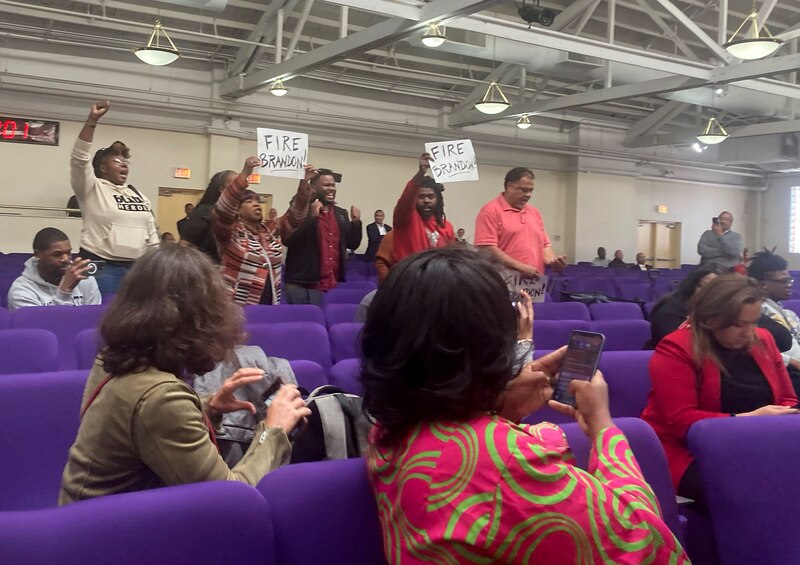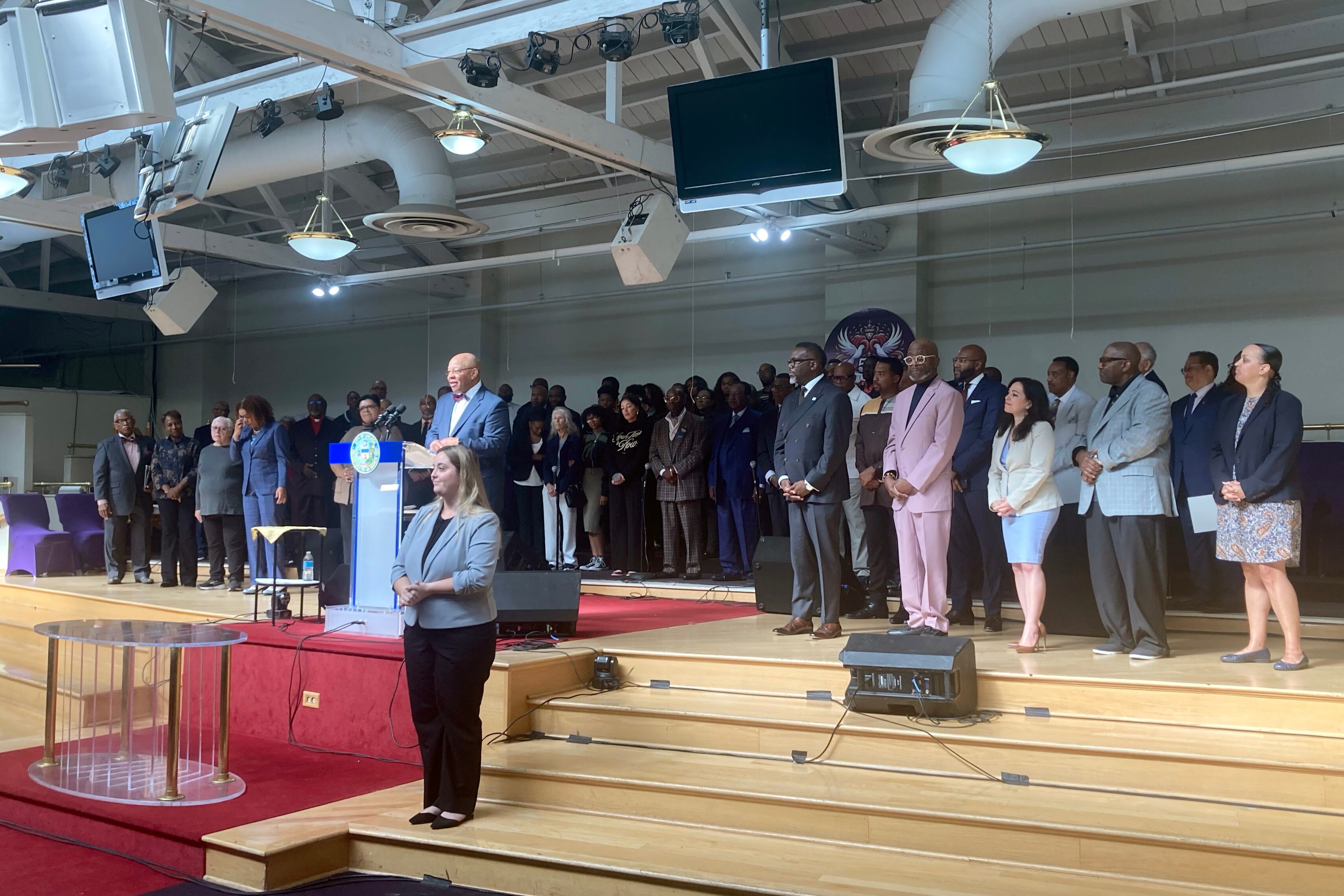Sign up for Chalkbeat Chicago’s free daily newsletter to keep up with the latest education news.
A defiant Mayor Brandon Johnson named six new members to the seven-member Chicago school board Monday, as fallout from the resignations of all board members last week escalated.
On Friday, the Chicago Board of Education’s current members said they would step down this month, an announcement coming after months of fiscal feuds featuring district leadership on one side and the Chicago Teachers Union and Johnson on the other. The outgoing board was appointed by Johnson but appeared to back Chicago Public Schools CEO Pedro Martinez’s approach to growing fiscal challenges.
The six appointees are: Olga Bautista, Debby Pope, Michilla “Kyla” Blaise, Mary Gardner, Frank Niles Thomas, and the Rev. Mitchell Johnson. The mayor’s office had initially said the mayor would announce seven appointees Monday morning. Johnson said Monday he would fill the seventh and final board seat soon.
He acknowledged that the appointees he announced Monday are still being vetted before they are officially sworn in later this month.
At least three of the appointees have gotten involved in notable ways in this year’s first-ever Chicago school board elections.
Blaise, a former political consultant who serves as chief of staff for Cook County Board Commissioner Frank Aguilar, was a candidate in the city’s first school board election in November but withdrew in early September. Debby Pope, a former teacher who as of Monday afternoon described herself as a part-time CTU employee on her account on X, the social media site formerly known as Twitter, filed campaign finance paperwork, but did not run — instead, she backed a CTU-endorsed candidate in her district. A CTU spokesman later said she retired from the union in June, and her X profile has since been updated and made private.
Mary Gardner, a West Side community organizer, challenged the signatures on the ballot petitions submitted by three candidates running in the school board’s District 5 election; all three were ultimately removed from the ballot.
Over the weekend, 41 of Chicago’s 50 aldermen — including key Johnson allies — signed a letter condemning the board shakeup, which comes just weeks before voters elect 10 members of a new 21-member board that will take over in January. They also called it unprecedented and destabilizing for Johnson to pick new board members amid CPS contract talks with the Chicago Teachers Union, which helped elect Johnson; the mayor is a former CTU organizer.
The aldermen demanded hearings before the mayor appoints any new members; a special hearing on the issue is slated for Wednesday.
Some state lawmakers and organizations representing the city’s business community also condemned Johnson’s actions. And Illinois Latino Agenda, a statewide coalition of Latino leaders, hosted a press conference later Monday to voice their own concerns about the move and call for transparency in running the school district.
But on Monday, Johnson forcefully pushed back, insisting the city elected him mayor to transform public schools — not to oversee cuts to staff and programs. He argued that the criticism of the shakeup is rooted at least in part in his identity as a Black man running the city, saying his detractors are “making the same argument of the Confederacy.” He stressed repeatedly he is simply using his power to appoint board members to ensure a smoother transition to a partly elected board early next year.
“I am using my authority that the people of Chicago gave me, which is to hurry up and make sure the students of Chicago get what they deserve,” he said at a press conference at Sweet Holy Spirit Church on the South Side.
The beginning of Monday’s press conference was disrupted by hecklers chanting that the board appointments are “not legit.” Some also protested the prosecutions of protesters against violence in Gaza. Both groups were escorted out.

Johnson did not explain why he was only appointing six board members Monday, not seven. But he said with lots of interest in the unpaid board slots, it won’t be a problem to appoint another member.
He said the focus of all Chicago elected officials should be on securing more funding from the state. But some of his critics have argued the discord could undermine the district’s push for more funding to skeptical state officials.
Bautista, one of the appointees and the co-executive director for the Southeast Environmental Task Force, said she wants to get more funding for the city’s schools, expand staff, and fill teacher and other vacancies. Bautista said the scrutiny of the board turmoil is misplaced: “Where’s the outrage over what’s at stake if we don’t fully fund our schools?”
Johnson was already slated to appoint 11 members to join the 10 members elected in November —the new board will start its term in January. A joint Friday afternoon press release from the mayor’s office and the departing board members stated that seating some of these appointees now will give them a head start on serving on the board, making for a smoother transition come January.
That argument may be falling flat with many officials. In their letter, the aldermen cautioned against adding to the district’s already significant debt burden. They argued Johnson focused too much on obtaining funding for a new Chicago Bears stadium rather than for schools — all while he and the union criticized Martinez for failing to talk state lawmakers into giving CPS more money.
“A School Board full of lame-duck appointees carrying out only a few months of a term before residents get a chance to elect representatives is not what is in our best interest,” the aldermen wrote. “A revolving door of CEOs that cannot complete more than a handful of years before transitioning out is not in our best interest.”
One key issue with appointing new members on the cusp of the election is that mayoral appointees must live in the half of each district not represented by the member elected in November. Until those election results come out, it will remain unclear whether the people appointed by Johnson to the board on Monday meet that requirement.
During Monday’s press conference, the mayor seemed momentarily stumped when asked if any of the appointees are running for school board seats; none of them are.
Johnson fought CPS CEO over budget, pension payment
The crux of the dispute at CPS was Johnson’s pressure on the board to take on a short-term, high-interest loan to cover the cost of a new contract the district is negotiating with the teacher union. The mayor also reportedly pushed the board to fire Martinez over his own refusal to take out the loan.
The CPS leadership turmoil began this summer as negotiations between the district and the union plodded along, and Martinez unveiled a budget that did not include money for teachers raises or other union demands. His budget also did not include a $175 million payment to a city fund that covers pensions for non-teaching CPS staff.
During the term of Johnson’s predecessor, Lori Lightfoot, Johnson and the union argued city government should continue to cover that payment as it had historically. But this summer, in an about-face, they insisted that the district should take it on to allow Johnson to pursue his progressive agenda. Chicago is facing its own budget deficit.
The mayor has said that after running on a platform of transforming public education in the city, he cannot condone cuts to staff and programs.
The mayor balked at calling on his new appointees to weigh in on taking out a loan or forcing out Martinez. However, Mitchell Johnson, one of Johnson’s appointees and the former executive director of the Developing Communities Project, said he hasn’t seen enough dedication to transforming schools from the “corporate leaders in CPS.”
The final Johnson appointee is Niles Thomas, a U.S. Air Force veteran and a labor and political organizer who formerly worked as 21st Ward superintendent for the Department of Streets and Sanitation.
Martinez has come under heavy criticism from the union in recent months.
The acrimony between Johnson and Martinez spilled into public view when the CPS CEO said the mayor asked for his resignation late last month, although Johnson has disputed that.
Martinez has said he does not intend to resign. He has gotten some support from district principals, business leaders, and some elected officials.
In a Monday statement, CTU President Stacy Davis Gates said the union “looks forward to collaborating with the new board members to enact the transformation of our public schools that our students and educators need and deserve.”
This story has been updated to include additional comments from Mayor Brandon Johnson, his appointees to the Chicago Board of Education, and Chicago Teachers Union President Stacy Davis Gates. It also includes a clarification that Debby Pope retired from the union earlier this year.
Mila Koumpilova is Chalkbeat Chicago’s senior reporter covering Chicago Public Schools. Contact Mila at mkoumpilova@chalkbeat.org .






